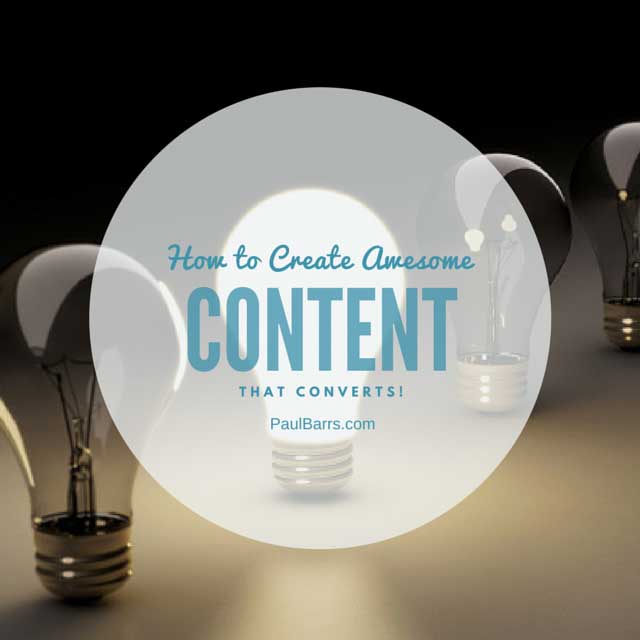
11 Aug Content That Converts
It doesn’t matter how much content you write for your website, if that content doesn’t CONVERT it means nothing. In this video you’ll learn how to structure a solid content conversion page so it generates both traffic and conversions.
Are you tired of not getting enough traffic through search engines? Not getting the conversions on your website that you want? Well, I’ve got one quick and easy solution for you that’ll answer all these questions and more.
One of the questions I get asking most, following my workshops, is, “Paul once we get people to our website, how then can we actually get them to buy more things from us?”
It’s an interesting question, don’t you think? And it’s one that we all face. Getting traffic is one thing, but it’s not good enough just to get traffic to our websites. We also have to get that traffic to convert into customers.
So today I’d like to introduce you to a unique phrase, what I call a “Content conversion page“. It’s a page which is a primary page on your website, it’s featured, and it serves multiple purposes.
First of all let me just explain what it is. Number one, it is a content page, and we’ve all heard the phrase, “Content is king.” So it’s a page based on keyword research, that focuses on a topic, not just a keyword. For too many years we’ve been told that in order to get search engine traffic, we must write pages for this, and for this, and for that, and we’ve got to look at keywords and find our niche. Then look at long tail and do all these wonderful, fancy things. It’s actually a whole lot easier than that now, especially with the latest updates from Google.
I’d like you start thinking about things a little bit differently. Rather than focus on keywords, focus on keywords within a topic. Does that make sense?
Not just an initial keyword phrase, but a number of keywords that talk about a common topic.
They have a theme. So these content conversion pages that I’m talking about, are solid content pages based on a topical theme. Of course in that, you get to talk about a number of different sub-topics, which are your keyword phrases, throughout the page.
Now first things first, you may be getting the idea that this isn’t a short page, not something that is this big it’s probably a little bit longer. How long? Well that’s entirely up to you, and depends on the topic. But from an SEO, a search engine optimization and marketing point of view, I’d like you to think of it like this.
When a customer searches for whatever they’re looking for, what else do they also want to know about that topic? Because that’s how Google is now approaching things.
- It’s not just, “Hey this is what I’m looking for.“
- It’s, “Hey this is want I want, but I also need this.“
So these content conversion pages are good, solid content pages and they allow you to express your authority. Yes, you as an authority in your industry, in your business, in your sector, on your product, your service.
So your keyword research, using the tools that we would normally access, will help you come up with a list of about half-a-dozen, could be four, could be five, six, or seven, eight, no problem. Twenty? Too many. About half-a-dozen different keyword phrases all on a particular topic, and because your research has shown you that your customers are looking for this page and there’s a lot of search, and perhaps not so much competition you found a niche in there or an opportunity through your competitive analysis, that you write a good solid “Content conversion page”. That’s the content.
It’s listed out, there’re good titles, there’re bullet points, there are images which enhance the content on there, there are guides, phrases to “read more“, to “see what I mean“, “have a look at” “what about“, and you guide people through this.
When they get to the bottom, then we come to the conversion section. Even before the bottom, depending on the content of the page and how it’s written, I want you to understand that you also must have a targeted goal for this page. What is the goal of your website? Is it to have someone buy product from you and actually purchase it online?
Then perhaps for a category of your products, you could have a single content-conversion page about those type of products and the topics that surround decisions, making those products.
At different stages throughout the page, perhaps half way or three-quarter way down, you will then say, “Look at this in our shop” and it’s an image, not just text, of you here but an image that says, “Check out our shop now” or “Buy this product now.” Or some kind of call to action which then links to the shop, and you, of course have that always, again at the very bottom.
May be your goal is instead to have them contact you, to fill out a service agreement, to register for an event. That’s fine. You have your content page and the conversion is “Register now,” “download now,” “do ‘something’ now.”
When you set a page like this, it serves three different primary purposes.
Number one, it’s incredible for the customer. For those people who are looking for something and then they find, they go, “Yes this is exactly what I want.” “This is exactly . . . these people they understand the problems I’m having, the decisions, the information I’m looking for,” because it’s all there in one page. So it’s fantastic from a customer point of view.
It’s also great for SEO because you’re writing good authority topic content. And you’re targeting not just a single keyword phrase for the 300, or 400 article, “Oh, ah, yawn. Boring arse.”
You’re showing and you’re proving that you actually have what it takes to service all of their needs. You’re giving this information from a keyword point of view with multiple keywords within the topic, and hey, guess what? The search engines love that stuff. Num, num, num. They want more of it, which is why you must also do it.
Then thirdly, from a social-media aspect, we often wonder how can we get more links to our website? How can we get people to share our stuff? Very simply this. You write share-worthy content. And a good solid content conversion page is exactly that, it is good quality content. People are going to want to share it, if it’s their area of interest. So those three main reasons are incredible.
And there’s a fourth bonus thrown in here as well. If you ever doing some kind of pay-per-click advertising, and you’re advertising for a topic not a specific product or a specific event. Then these types of pages are fantastic to send that paid traffic directly to. Because it proves you as the authority and then says, “Buy now,” “Order now,” “Click here,” “Do this,” perform this action.
So that’s four reasons why you should have one of these content conversion pages.
Let me just wrap up with two other simple points that’re worthwhile considering, in all of this. Number one, as you build your site, add to your blog, create other pages, all of these type of things, creating pages and blog posts and information that are not specifically for conversion purposes . . . Don’t do this on a product sale page, but as you add to your blog and other pages, if you mention the topic that you’ve spoken about in one of your “Content conversion pages.” well it’s real easy.
You just simply send people by a link a good hypertext anchor link, anchor text, about that topic, about one of the keyword phrases, and send them through. Does that make sense? It’s a really easy way to be able to get traffic and generate the internal authority of these types of pages.
So let me just sum those ones up for you quickly, if you haven’t taken notes, you need to take notes now. A “content conversion page” is based on a topic, within that topic there may be multiple-keyword phrases that are grouped together, and you’re targeting them all within that content.
They are awesome for customers to read – it’s what customers are looking for. They are awesome to then also be shared because people go, “This is exactly what I want.” They are terrific for putting your information together in such a place and then proving your authority to then say, “Click here,” “Contact us now,” “Register now,” “Now buy the product,” whatever it might be.
Of course the final thing that you absolutely must do with these, is set up Google Analytics and your goals for tracking purposes. Remember “Content conversion page,” which simply means it’s content that must convert.
So if you have topic A and then the call to action, that button will link through to a product purchase page, or a registration form or something like that, so you’ve got step A, step B, in your analytics goals, Step C then is the final action taken.
So if you have a content page coming up about say, an event that you’ve got coming up, it’s all about the event and the topic that will be covered. They click through to B which is the registration form . . . and it’s not just a boring-arse form on its own, it has a little bit more information, it has a stronger call to action, it has a good reason to register. And so they register that form and then they come through to the “Thank you” page at the end – step C, and the goal is achieved.
But with analytics you set up the goal to start on step A, the content page, to continue on step B, registration or the purchase, or the “buy product”, and then is completed on the “thank you,” the “download now.” Whatever it might be.
Those are the tracking purposes that you need. Whether you’re using it for pay per click, or whether you’re using it for just general search, or whether you’re using to share in social media, you must have those goals.
Here’s the key, content conversion, it must be there to convert, it must offer solid content. If all . . . I guess you were to take home from this, nothing else but this, here’s what you must remember.
Customers buy from people who they believe they can trust, people that they know. The longer you get someone to spend on your page, the more they will believe in you, the more they will trust you, the more likely they are to then buy from you.
A content conversion page serves all of these purposes that I’ve listed. If you don’t have any on your website, you need to do your keyword research now and start building some. Building that internal link system, setting up your goals, getting the traffic and converting it.
If you’re in my local area, here in Australia, please give me a call, I can help you with this. I’ll look forward to it. Bye-bye.


